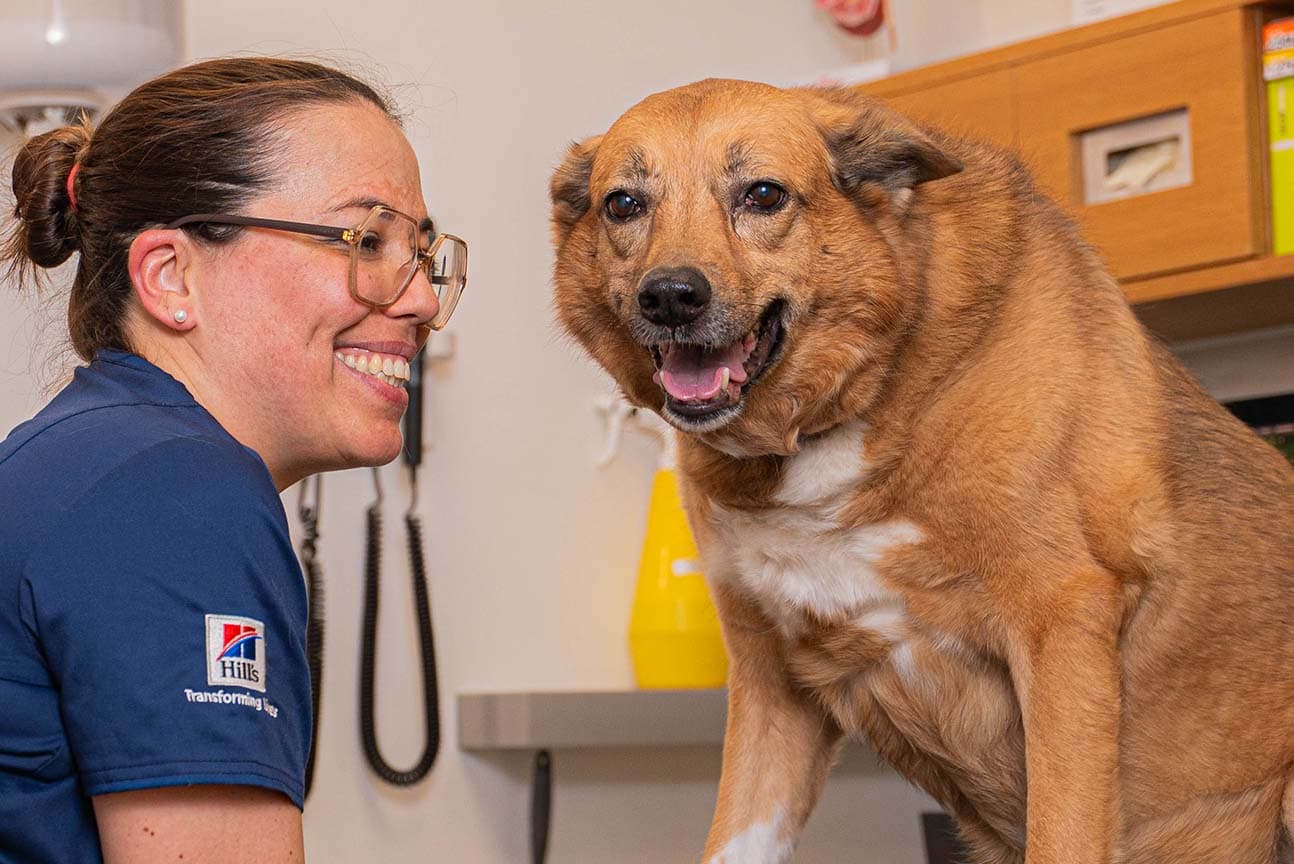Reviewed by Dr. Sarah Yosry
Updated on 04/09/2025
Reading time 4 min.
Overview
Severity: Low
Life stage: All
The unique climate and environment of the UAE can pose challenges for our four-legged friends, from the intense heat to the risk of dehydration and related health issues, including urinary tract infections(UTIs). Being aware of these factors can help you keep your pet comfortable and well.
If you’ve noticed your dog straining to urinate, having accidents indoors, or passing smaller amounts of urine than normal, it could be due to a UTI or another urinary issue. Because these signs can have several possible causes, it’s important to contact your veterinarian as soon as possible. The good news is that UTIs in dogs are quite common and usually easily treatable when diagnosed early.
What Is a Urinary Tract Infection in Dogs?
A urinary tract infection occurs when bacteria enter and multiply in your dog’s urinary system, which includes the kidneys, bladder, ureters, and urethra. UTIs most commonly affect the lower urinary tract, especially the bladder, resulting in inflammation and discomfort. Cystitis is a general term used to describe inflammation of the bladder.
In Dubai’s warm climate, dogs may be more susceptible to UTIs due to factors like dehydration, concentrated urine, and increased bacterial growth in humid conditions. Female dogs are generally more prone to UTIs than males due to their shorter urethra, but any dog can develop one.
Recognising the Signs: Is Your Dog Suffering from a Urinary Tract Infection?
As pet owners, we know our dogs better than anyone. Here are the most common symptoms to watch for:
Primary Symptoms
- Frequent attempts to pass urine, often with smaller amounts produced
- Straining or appearing uncomfortable while urinating
- Blood in the urine (pink, red, or brown discolouration)
- Strong-smelling or cloudy urine
- Accidents indoors despite being house-trained
- Excessive licking of the genital area
Secondary Signs
- Increased thirst
- Lethargy or reduced appetite
- Vomiting and diarrhoea
- Abdominal pain
- Whimpering or crying during urination attempts
- Fever (though this is less common)
If you notice these symptoms, it’s time to contact your local veterinarian.
What Causes Urinary Tract Infections in Dogs?
Understanding the causes helps prevent future episodes. Several factors contribute to UTIs in dogs, with some being particularly relevant to life in Dubai:
Climate-Related Factors
- Dehydration: Dubai’s intense heat can lead to concentrated urine, creating an ideal environment for bacterial growth. When dogs don’t drink enough water, their bodies can’t flush out bacteria effectively.
- Heat stress: Extended periods in air conditioning followed by exposure to extreme outdoor temperatures can stress your dog’s immune system, making them more susceptible to infections.
General Risk Factors
- Poor hygiene: Bacteria from the environment or faecal matter can travel up the urinary tract
- Underlying health conditions: Diabetes, kidney disease, Cushing’s disease, bladder crystals and stones, or bladder tumours can predispose dogs to UTIs
- Senior dogs and females tend to be more vulnerable
- Body condition: Overweight dogs are at a higher risk
- Compromised immune system: Stress, illness, or certain medications can weaken natural defences
- Urinary retention: Holding urine for extended periods allows bacteria to multiply
Treatment Options for Urinary Tract Infections
The good news is that, when caught early, most urinary tract infections respond very well to treatment.
Veterinary Diagnosis
Your veterinarian will usually perform a urinalysis to identify bacteria and assess other elements of your dog’s urine. In some cases, a urine culture may be necessary to determine the specific bacteria and the most effective antibiotic.
If your dog’s symptoms don’t improve, or if they suffer from repeated infections, your vet may recommend further tests such as blood tests, X-rays, or ultrasound scans.
Veterinary Treatment
- Antibiotics: Most cases are treated with a course of antibiotics, usually for 7–14 days. Even if your dog seems back to normal before finishing the medication, it’s important to complete the full course to fully clear the infection.
- Pain relief: If your dog is uncomfortable, your vet may also prescribe pain relief.
- Diet and supplements: In some cases, your vet may recommend a special diet or supplements to support urinary health and help reduce the chance of repeat infections.
Supporting Recovery at Home
- Provide easy access to food and water
- Take your dog outside frequently for toilet breaks
- Monitor their appetite, energy levels, and other symptoms closely. Report any concerns to your vet
- Maintain a comfortable indoor temperature, and allow your dog to rest
- Organise follow-up appointments as recommended
What to expect
With the right treatment, most dogs recover from a UTI within 1–2 weeks. During this time, they’ll need a little extra care and attention. By following simple prevention tips tailored to Dubai’s climate, you can help reduce the chances of future infections.
Prevention of Urinary Tract Infections
Prevention is always better than cure, especially in challenging climates. Here are some simple, practical tips to help your dog stay healthy.
Improve hydration
- Provide constant access to fresh, clean water. Use multiple water bowls around your home.
- Make sure your dog only drinks clean, safe water, not from pools, the sea, or other unsafe sources.
- Consider adding water or wet food to your dog’s diet for additional moisture
- Take water on walks and outdoor adventures
Maintain proper hygiene
- Keep your dog’s genital area clean and dry
- Regular grooming helps prevent bacterial buildup
- Clean up accidents as soon as possible
- Give your dog regular breaks to urinate throughout the day
Climate Considerations
- Avoid prolonged outdoor exposure, especially during peak heat hours
- Provide shaded areas and cooling mats
- Consider shorter, more frequent walks rather than long sessions
- Monitor for signs of overheating, which can stress the immune system
Regular Health Monitoring
- Organise routine vet visits to discuss your dog’s overall health and catch potential issues early.
- For senior dogs or those prone to repeated UTIs, your vet may recommend regular urine tests.
- Help your dog maintain a healthy body weight and provide plenty of mental and physical stimulation.
- Feed a diet that’s balanced and appropriate for your dog’s age, size, and lifestyle to support overall well-being.
When to Seek Emergency Care
While most UTIs aren’t life-threatening, certain symptoms require immediate veterinary attention:
- Complete inability to urinate
- Severe lethargy or collapse
- Signs of severe pain (shaking, arched back, reluctance to move)
Modern Vet Hospital in Dubai has excellent 24-hour veterinary facilities, so don’t hesitate to seek help if you’re concerned about your dog’s condition.
Worried your dog might have a urinary tract infection? Book a checkup or emergency appointment today at Modern Vet Hospital in Dubai. Our experienced team provides accurate diagnosis, effective treatment, and ongoing care tailored to your dog’s needs.
Share this, choose your platform!
Reviewed by
Dr.Sarah Yosry
DVM
A product of a rich Australian/Egyptian heritage, Dr. Sarah Yosry stands as a testament to the union of diverse cultures and a shared love for animals.



